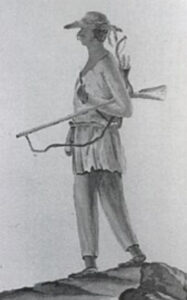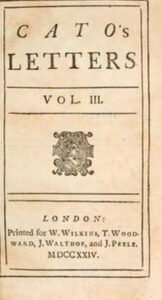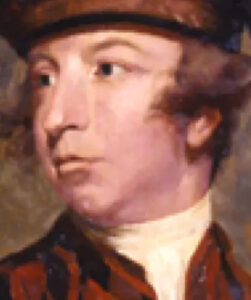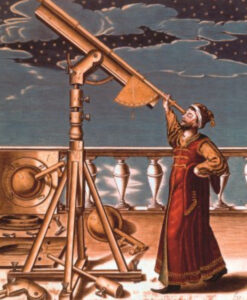Americanism Redux
April 3, your today, on the journey to the American Founding, 250 years ago, in 1775
It’ll happen. The unknown is the where, the how, the who.
But any doubt that it will happen?
Really, no. None.
The great big thing that people knew might or could or would or should happen? Now, it will happen.
It’s today, April 3, 250 years ago.
* * * * * * *
Mercy Warren looks out of the family home in Plymouth, colony of Massachusetts. She wishes her husband was here. She’d like to talk with him.
“What’s the latest? And what do you think it means?
She can’t ask because he’s not home. She’s thinking about who she can ask.
Who would know? Whose word would I want to take on it?
She loves the idea that people everywhere deserve liberty and freedom. The fullest implications of the idea? Well, she doesn’t have all the answers on those points.
But she knows the American colonists deserve freedom as their birthright. To her, that’s bedrock. She knows the Coercive Acts now causing great suffering in Massachusetts are the opposite of that freedom. She knows things are on the knife’s edge. Her hope and wish are that the worst can still be avoided. Calamity can be sidestepped.
She wonders about the latest news. Have you heard anything? If you have, maybe stop by Mercy’s house and let her know.
* * * * * * *
His family knows him as Uncle Jim. Over there, that’s him walking—sorry, limping, from an accident, his foot never healed right. He’s James Hayward, a schoolteacher, and tomorrow is his birthday. No one will celebrate because hardly anyone in Acton, colony of Massachusetts, celebrates any birthday. It’s not a thing people do. So Jim limps out of the house with his bad foot and says to himself: tomorrow, I’ll be 25.
Jim is part of the town’s militia and he’s been training with the unit regularly. His bad foot had gotten him out of normal training days, but these are far from normal days in early April.
Over on the wall, that’s Uncle Jim’s musket. Powderhorn, too, hanging from a peg.
If you could see the future sixteen days from now, you’d see the powderhorn riddled with bullet holes. You’d see a musket on the morning ground. You’d see Uncle Jim dead.
Less than three weeks after his 25th birthday that no one celebrated.
* * * * * * *
The Provincial Assembly in Massachusetts—functioning as an unrecognized, unapproved, and unallowed anti-imperial governing authority—determines that money will be issued to buy gifts for Nipmuck, Wappinger, and Mohican Natives who have joined “minute-man” units in Massachusetts. The gifts are meant to show gratitude for their willingness to serve as emergency war responders, turning out at alarm and engaging in immediate combat. Comparable gifts will be purchased to motivate a similar decision by Mohawk Native warriors. The minute-man units are separate from the militia units that include the limping James Hayward.
Colonel John Patterson and Captain William Goodridge are placed in charge of the gift-purchasing and distribution.
* * * * * * *
The supposedly recognized formal governing authority in Massachusetts—British General Thomas Gage, his Redcoat units, and whomever maintains loyalty and allegiance to them—reaches a determination different from the one made by the illegal Assembly today. Gage has learned of reports in Bristol County that people loyal to England are having hot tar poured down their naked backs. To get at the truth of the matter, Gage orders 200 Redcoats to assemble for immediate transport into the county. However, he wants local people there to house the Redcoats in their homes. Gage orders officials in Bristol County to send a list of people whose homes they can use for the Redcoats. It’s all part of how the Quartering Act is supposed to work.
No response yet from Bristol County. The Redcoats await deployment.
* * * * * * *
Here’s a revealing gauge of the day.
The Reverend Joseph Sumner has delivered his most recent sermon in Marlborough, Middlesex County, colony of Massachusetts. The Scriptural basis of his sermon is Psalm 144, verse 1: “Praise be to the Lord my Rock, who trains my hands for war, my fingers for battle.”
A friend of Sumner’s describes the sermon as a “military lecture.”
Listeners in the church pews know what’s coming.
* * * * * * *
The mood in Philadelphia has a different feel to it.
Ships originating in London and arriving in port via Barbados are bringing news of a potential deal to reduce the imperial-colonial crisis. Ship captains are saying that some of the Coercive Acts imposed on Massachusetts will be repealed—no word as to which specifically, just “some.” Perhaps cooler heads make for steadier hands to smooth the edge off the knife. Can a blade be de-sharpened?
John Benezet, leader of a committee to enforce the economic boycott of British goods in retaliation for the Coercive Acts, has a notice printed in local newspapers. The committee, Benezet announces, has learned that Dutch ships are landing in Philadelphia with goods purchased in England for resale in the colonies. That’s a violation of the boycott, states Benezet. He and the committee call on local residents to cease their purchases of Dutch-sold goods.
A proposed local tax and regulation on chimneys in Philadelphia has come under protest. The stated purpose of the tax will be to help lower public costs of supporting poor people who can’t find a job. Opponents of the proposed chimney tax declare that private charity has done excellent work in assisting the unemployed and the unemployable. This added tax, they assert, is an example of excessive government power. Isn’t that what we’re arguing about with Parliament?
Finally, the Pennsylvania Evening Post prints “Essay #96 of Cato’s Letters.” This series of public essays, first written and published more than a half-century ago in 1722, offers insights shocking in their timelessness and placelessness.
“The truth is, all men dread the power of oppression out of their own hands, and almost all men wish it irresistible when it is there (in their hands).”
“Parties like or dislike our constitution, just as they are out of power, or are in it.”
It concludes with an appeal to consider what’s best for the whole of us, and to restrain power at every turn.
Cato’s 96 was a reminder for people regardless of clock or calendar, marker or map.
* * * * * * *
Robert Murray, known as Lord Dunmore the imperial governor the colony of Virginia, issues a public proclamation to the people in his colony. His topic is the proposed second “congress” set to meet in Philadelphia, starting May 10, five weeks away.
All Virginians are called to “prevent any such Appointments of Deputies” to the meeting, and to urge your friends and neighbors to desist from supporting such events. So get busy: start preventing and desisting.
Governor’s orders.
* * * * * * *
Let’s go back to Mercy’s house and knock on the door. You have something you want to tell her.
Also
Business as usual in Parliament and the halls of British imperial government.
Task One: King George III closes the loop on the “New England Restraining Act.” He signs it. It’s now the law. All trade and commerce in the New England colonies restricted to the British Isles and a handful of other places. Also, no fishing in the waters of Newfoundland. Call it the quadrupling-down of the Coercive Acts.
Check.
Task Two: House of Commons take up another reading of a second proposed bill, to restrain the trade of the following colonies of New Jersey, Pennsylvania, Maryland, Virginia, and South Carolina. We’re expanding the New England version just approved by the king. Prospects for legislative passage look strong. Call it the new extension of new imperial power.
Check.
Task Three: identify money for the continued operation of basic imperial governmental expenses in the following colonies of Nova Scotia, East Florida, West Florida, and Georgia. Routine work. Call it another day, another dollar.
Check.
Task-list done and the machine rolls on.
Call it we ain’t changing a thing on this end.
For You Now
Looking over the stories that comprise today’s entry, I’m focusing on limits. The limits stand out to me. You see them in Gage and Dunmore’s actions, the two governors and imperial officials. Limit: Gage can’t get a list of people willing to house Redcoats. Limit: Dunmore issues a proclamation mind-boggling in its certainty of unenforceability. The authority and, more importantly, the influence exerted by Gage and Dunmore runs literally no further than the tips of their quill pens. When that becomes true, things are happening.
There’s our phrase: “when that becomes true, things are happening.” Let’s hold on to that.
When some Native warriors are willing to enlist in emergency military responder units, things are happening.
When a Christian minister decides to instruct in war-making from the pulpit, things are happening.
When a young man who had a legitimate excuse not to train in his volunteer militia unit now reverses his decision, things are happening.
And so on.
I’ll close with two eternals. One is the local friction in Philadelphia over a proposed chimney tax for public welfare services. They’re arguing over it while a lot of much bigger stuff is happening.
Sound familiar?
The other is the incredibly powerful essay by John Trenchard and Thomas Gordon—Cato—that feels as enduring as the stars and stones. Internal and interwoven in the daily things, big stuff is happening.
It better always sound familiar. The moment it doesn’t, this Experiment is over.
Suggestion
Take a moment to consider: do you sometimes feel like Mercy Warren?


















Speak Your Mind
You must be logged in to post a comment.